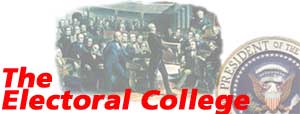A First-Hand Look at the Selection of the President

|
Congressional Record Accounts A First-Hand Look at the Selection of the President |  |
|
Electoral College Home U.S. Code Constitution Precedents Federalist 68 PDF reports History How it Works Elections (PDF) Congress' Role Back to the main page |
The most exciting moments in the history of the electoral college can be found first-hand in these accounts from the House Journal and Congressional Record. 1801 -- Election of Thomas Jefferson
1821 -- Election of James Monroe
1825 -- Election of John Quincy Adams
1829 -- Election of Andrew Jackson
1865 -- Election of Abraham Lincoln
1869 -- Election of Ulysses S. Grant
1873 -- Re-Election of Ulysses S. Grant
1997 -- Election of Bill Clinton
2000 -- Election of George W. Bush
These files are in PDF format. You will need the free Adobe Acrobat Reader to read them. |
|
Front Page | About |
Search ElectoralCollegeHistory.Com |
 |